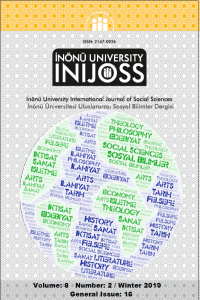Abstract
18.
Yüzyılın en önemli ve etkili düşünürlerinden biri kuşkusuz İskoç filozof David
Hume’dur. Hume yaşadığı dönemin epistemesine uygun olarak bir felsefe inşa
etmeye çalışmıştır. Bu epistemenin en belirgin özelliği doğa temelli bilimselliktir.
Hakikatin doğada ve doğal yöntemlerle aranması gerektiği biçiminde
özetleyebileceğimiz bu yeni paradigmanın etkisinde kalan Hume, aynı metodolojinin
moral (insanî) konulara da uygulanması gerektiğine inanmıştır. Bu düşünceden hareketle
Hume, insanı bilişsel ve eylemsel durumunu analiz etmeye kalkışmış, insan zihni
ve edimlerinin nihai ilkelerini tespit etmeye çalışmıştır. Doğal olarak bu
yaklaşım, felsefi çevrelerde çokça söze konu edilmiştir. Bu çalışma Hume’un bu
temelde kurmaya çalıştığı moral teorisine ilişkin yapılan kimi
değerlendirmeleri analiz etmeyi amaçlamaktadır.
References
- Aydın, M., (1991), Kant’ta ve Çağdaş İngiliz Felsefesinde Tanrı-Ahlâk İlişkisi, TDV Yay., Ankara.
- Beauchamp, T., (1999), “Annotations to the Enquiry”, An Enquiry Concerning Human Understanding, ed. Tom L. Beauchamp, Oxford University Press.
- Çelebi, E., David Hume’da İnsan Doğasının Evrenselliği Temelinde Ahlâk Problemi, Uluslararası İnsan Bilimleri Dergisi, 2011/8, (1), ss. 657-665.
- De Dijn, H., “Hume’s Nonreductionist Philosophical Anthropology”, The Review of Metaphysics. March 2003/56, (Info Track Web: Expanded Academic ASAP).
- Hendel, C.W., (1985).,“Editor’s Introduction”, An Inquiry The Principles Of Morals, içinde. The Bobbs-Merill Educational Publishing, Indianapolis.
- Hume, D., (1999), An Enquiry Concerning Human Understanding, ed. Tom L. Beauchamp, Oxford University Press.
- Hume, D., (1985a), A Treatise of Human Nature, ed. by Ernest C. Mossner, Penguin Books.
- Hume, D., (1985b), An Inquiry Concerning The Principles Of Morals, ed.Charles W. Hendel, The Bobbs-Merill Educational Publishing, Indianapolis.
- Hume, D., (1987), Essays Moral, Political and Literary, ed. Eugene F. Miller, Liberty Fund, Indianapolis.
- Liu, X., “Mencius, Hume and Sensibility Theory”, Philosophy East and West. Jan 2002/52, (Info Track Web: Expanded Academic ASAP).
- Sabl, A., (2002), “When Bad Things Happen From Good People (and Vice-Versa): Hume’s Political Ethics of Revolution”, Polity. Fall 2002/35, ss. 73-92.
Abstract
One
of the most important and influential thinkers of the 18th century is
undoubtedly the Scottish philosopher David Hume. Hume tried to construct a
philosophy in accordance with the epistemology of his time. The most prominent
feature of this epistemology is nature-based science. Influenced by this new
paradigm, which can be summarized as the fact that truth should be sought in
nature and by natural methods, Hume believed that the same methodology can and should
be applied to moral issues. Based on this idea, Hume attempted to analyze human
cognitive and operational case and tried to determine the ultimate principles
of human mind and its actions. Naturally, this approach has been widely
mentioned in philosophical circles. This study aims to analyze some of the
evaluations of Hume's moral theory formed on this basis.
References
- Aydın, M., (1991), Kant’ta ve Çağdaş İngiliz Felsefesinde Tanrı-Ahlâk İlişkisi, TDV Yay., Ankara.
- Beauchamp, T., (1999), “Annotations to the Enquiry”, An Enquiry Concerning Human Understanding, ed. Tom L. Beauchamp, Oxford University Press.
- Çelebi, E., David Hume’da İnsan Doğasının Evrenselliği Temelinde Ahlâk Problemi, Uluslararası İnsan Bilimleri Dergisi, 2011/8, (1), ss. 657-665.
- De Dijn, H., “Hume’s Nonreductionist Philosophical Anthropology”, The Review of Metaphysics. March 2003/56, (Info Track Web: Expanded Academic ASAP).
- Hendel, C.W., (1985).,“Editor’s Introduction”, An Inquiry The Principles Of Morals, içinde. The Bobbs-Merill Educational Publishing, Indianapolis.
- Hume, D., (1999), An Enquiry Concerning Human Understanding, ed. Tom L. Beauchamp, Oxford University Press.
- Hume, D., (1985a), A Treatise of Human Nature, ed. by Ernest C. Mossner, Penguin Books.
- Hume, D., (1985b), An Inquiry Concerning The Principles Of Morals, ed.Charles W. Hendel, The Bobbs-Merill Educational Publishing, Indianapolis.
- Hume, D., (1987), Essays Moral, Political and Literary, ed. Eugene F. Miller, Liberty Fund, Indianapolis.
- Liu, X., “Mencius, Hume and Sensibility Theory”, Philosophy East and West. Jan 2002/52, (Info Track Web: Expanded Academic ASAP).
- Sabl, A., (2002), “When Bad Things Happen From Good People (and Vice-Versa): Hume’s Political Ethics of Revolution”, Polity. Fall 2002/35, ss. 73-92.
Details
| Primary Language | Turkish |
|---|---|
| Subjects | Philosophy |
| Journal Section | Makaleler |
| Authors | |
| Publication Date | December 30, 2019 |
| Submission Date | November 5, 2019 |
| Published in Issue | Year 2019 Volume: 8 Issue: 2 |
İnönü Üniversitesi Uluslararası Sosyal Bilimler Dergisi

This work is licensed under a Creative Commons Attribution-NonCommercial 4.0 International License.


